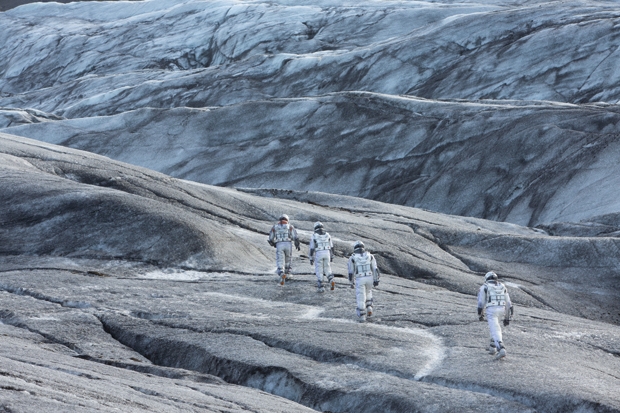Christopher Nolan’s futuristic epic Interstellar isn’t a clever film, or even a dumb film with a clever film trying to get out. Instead, and no matter what the hype may say, this is a dumb film with an even dumber film trying to get out. Even the tag line, which is also the basic premise, is super-dumb. It goes: ‘Mankind was born on earth. It was never meant to die here.’ Who says? How can anyone know what nature’s intentions might be? What did it intend for dinosaurs, for example? The golden toad? The use of ‘mankind’, rather than ‘humankind’, is also telling, as this is very much in the tradition of the alpha-male American superhero who single-handedly saves us (ladies too!; thanks!) from being obliterated, whereas I generally wish he wouldn’t. ‘For God’s sake,’ I often found myself thinking during this film, ‘let the obliteration begin so we can all go home.’
It’s a story told traditionally, in three acts, with the first act being by far the best, if only because it is at least semi-coherent. It is set at some time in the near-future when an unnamed natural disaster has caused dust storms and crops to fail and it is clear: unless the human race gets out quick, then it’s all over. Our hero is Cooper (Matthew McConaughey), a former pilot turned farmer, and single parent of two children who, through some hokey that is too complicated to go into here, and which I’m not sure I properly understood anyhow, is led to a secret Nasa compound headed by Michael Caine, playing Michael Caine. He wants Cooper to pilot a spacecraft through a wormhole to an unknown galaxy where humans may be able to live. Cooper is initially reluctant and has to be lured back into action, obviously. ‘You’re the best pilot we ever had,’ beseeches Michael Caine, while playing Michael Caine. Cooper is particularly close to his daughter, Murph, and the question asked is: do you leave your family to save humanity? This is asked urgently, with tears in eyes, even though, frankly, I have known people leave their families for quite a lot less.

It’s up into space, where the cinematography is often beautiful, I admit, with shimmering balls of intergalactic stuff emerging from the black, and planets of crusted ice. Nolan (Memento, Inception, the Dark Knight trilogy) is on it, visually, but it is tiring after a while; it feels like Star Trek turned up to 11. Meanwhile, the score is so emphatic it often drowns dialogue, while the characters are risible. Needless to say, Cooper is joined on-board by a chippy robot, but also there is Anne Hathaway (as Dr Brand), whose character is one of those women characters that has been included so the film can say it has a woman character, job done, no need to actually write that character. So Dr Brand is virtually character-less. She is stoic, stoic, stoic until she reveals the true reason for joining the expedition, then she cries shivery, womanly tears as she burbles on about love being able to transcend science.
And the action? There is peril. There is docking and undocking. There is a surprise cameo from a Hollywood A-lister who may or may not be Matt Damon. (I would never tell.) And there is much talk of relativity, tidal gravity, quantum data, other dimensions. Was a fifth dimension benevolently offering us that wormhole? I could not make head or tail of it. I accept this may be my limitation, as science isn’t my strongest suit, but on the way out of the screening I attended I asked a fellow reviewer if he had understood the plot and he said: ‘No, but that didn’t matter.’ I have asked the same question of those who love Doctor Who, and they say the same, and the only way I can respond to this is in capitals, so here we are: ‘WELL, IT MATTERS TO ME!’ I did learn something about time, though. This, at nearly three hours, comes in at the same length as Mr Turner, but whereas that went in no time at all, this seemed to go on for ever. And a day.
It doesn’t have much emotional heft, either. The emotional through line is between Cooper and Murph (Jessica Chastain), who does not forgive her father for leaving for many years, and thereby provides cinema’s longest ever sulk. Their relationship, post-sulk, is syrupy and sentimental and about as believable as a fifth dimension offering us a wormhole. But, mostly, Interstellar is super-dull and super-annoying and super-dumb because it posits itself as a film of many big ideas when it doesn’t even possess a single decent one. The end of the earth will never be the end of us? Who says? Plus, it’s pretty clear that when it comes to ‘saving the human race’ what America has in mind is saving America. The world is about to end, but at no point does any of the rest of the world come into this. It’s like nowhere else exists, can you believe. So, ultimately, my best advice to you? Ignore the hype. Stay home.






Comments